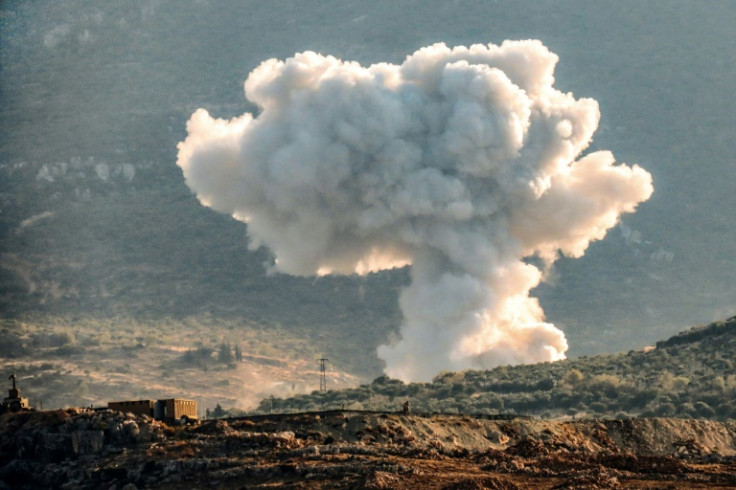Assad Regime And Russia Conduct Combined Attack On Civilians In Syria
Assad regime was forced to call a ceasefire after rebel forces responded to the relentless assault on civilian territories in Idlib, Syria.

On Monday this week, rebel forces retaliated to relentless airstrikes, conducted by the Assad regime and Russia, on Idlib and the western regions of Aleppo.
The retaliation of the rebel factions, going under the name Al-Fath al-Mubeen, resulted in the Assad regime calling for a ceasefire.
The decision for a ceasefire came after the rebel militants were successful in targeting military positions held by Assad's regime and Russian and Iranian forces.
The territories that were targeted by the rebel group, include the city of Qardaha, the Baathist officers' club in the Furqan neighbourhood of Aleppo, an operations room for Russian forces in the eastern countryside of Maarat Al-Numan, and the Jourin camp in the Hama countryside.
Sources on the ground claim that the retaliatory attacks, carried out by Al-Fath al-Mubeen, killed numerous members of Assad's regime, which inherently forced them to call a ceasefire.
Assad's regime said that the week of intense attacks on civilian territories in Idlib was in response to a mysterious drone attack in the Homs province, located in central Syria.
However, Abdurrahman Mustafa, the Head of the Syrian Interim Government, said: "The Assad regime is experiencing a crisis in the regions it controls. In order to distract attention directed here, the regime, Russia and Iran started to organize air and land attacks on Idlib and Aleppo."
Critics have also noted that Russia and the regime attacked Idlib, due to media and public attention being focused on the current Israel-Palestine conflict.
The alleged and anonymous assault on Homs, killed at least 100 people, with reports noting that most of the fatalities were soldiers belonging to Assad's regime.
The regime almost immediately blamed the drone attack on "armed terrorist organisations" and rebel forces who clearly had "international backing".
After the brutal conflict, which has taken place in the last week, tens and thousands of civilians in Syria's Idlib province have been forced into displacement.
You can hear the cries of children.
— Samer Daboul (@samerdaboul6) October 8, 2023
Assad regime exploits the world's attention on Palestine and continues its destruction in Idlib. Civilians in Idlib suffer in silence, as today, Russian and Iranian-backed Assad forces targeted a camp for displaced people in Idlib. pic.twitter.com/oAGrnflKeS
The airstrikes targeted 61 civilian settlements within the de-escalation zone in Idlib, with Mohammed Hallaj, the director of the Syria Emergency Response Coordinator, telling reporters that the brutal bombardment of attacks was carried out by Assad's troops and Russian militants from land and air.
Hallaj also confirmed that weapons that violated a series of international laws were also used around nine times killing a total of 42 civilians.
The number of fatalities includes 12 children and nine women.
An investigation into the attacks also found that at least 215 other civilians had been injured.
"Fifty-one public buildings, including 11 schools, seven tent camps, [and] 15 health facilities, were hit in Idlib," he said, pointing out that 79,000 civilians have been displaced as a result of the attacks," Hallaj announced.
"Two employees from humanitarian aid organisations died and four employees were injured in the attacks," he later confirmed.
Ismail Alabdullah of the White Helmets rescue service operating in Idlib, also told reporters that between the 4 and 7 of October, Russia and the regime targeted the civilian areas with a "systematic assault" of conventional bombs, artillery and thermobaric missiles.
A statement, published by Al-Fath al-Mubeen (rebel forces) on Monday 9 October, announced: "Assad's criminal gangs are demanding a military calm after targeting sensitive positions deep in the occupied areas."
"Our clear stance is that whoever started bombing civilians in the liberated areas should stop their aggression, or our strikes will continue towards new locations deep inside their territory," Al-Fath al-Mubeen added.
Colonel Mustafa Bakour, who left the regime to become a Commander for the rebellion, told The New Arab's sister site Al-Araby Al-Jadeed: "The regime, Russians, and Iranians have no history of adhering to treaties, pacts, and agreements."
"If they do not commit [to the ceasefire], the response will naturally be stronger than what happened in recent days and will reach deep into enemy territory," Bakour warned.
© Copyright IBTimes 2025. All rights reserved.





















